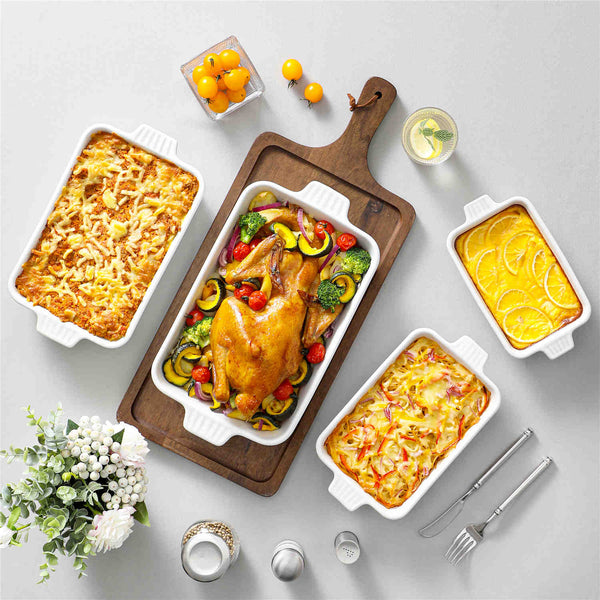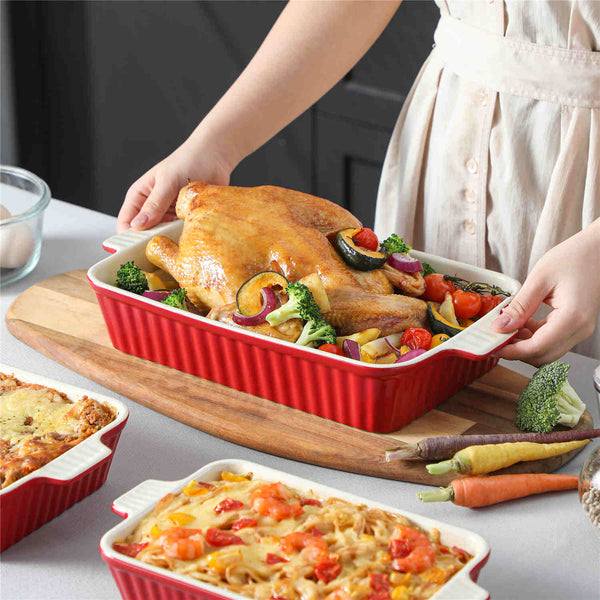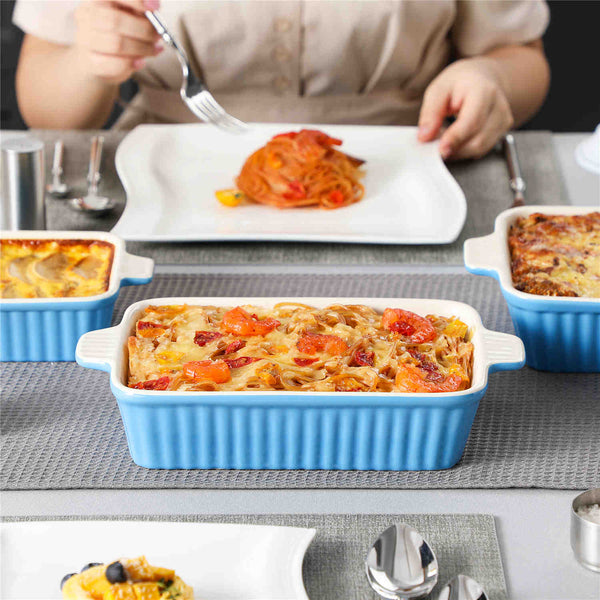What makes good bakeware?
Navigation
- Major factors defining a good bakeware
- Baking scenarios and bakeware considerations
- Benefits of investing in a good quality bakeware
A good bakeware can create a huge difference in your baking outcome. A high-quality bakeware distributes the heat evenly. This even heat distribution ensures that baked goods cook uniformly without burning or undercooking.. A good bakeware is often durable. If handled and maintained properly, it can last longer and continue to provide consistent and reliable results.
Moreover, many high-quality bakeware have a non-sticking coating. This coating allows you to remove the baked products easily without sticking to the surface of the pan. Using a good quality bakeware can also improve the overall appearance of the baked goods. In fact, it gives them a more professional look.
Some bakeware materials, such as silicone and certain metals, are considered safe for baking and don't allow any harmful chemicals to enter the food. So, investing in a good quality bakeware can significantly improve your baking experience and the quality of the baked products.
Major factors defining a good bakeware
There are some key factors that define a good quality bakeware. If you are planning to purchase bakeware, we recommend you analyze these factors before making the final purchase.
Material
Undoubtedly, the material of the bakeware plays a crucial role in its performance. Here are some common materials for bakeware and their specific characteristics:
Metal: Metal further includes three options, i.e., Aluminum, Aluminized steel, and Stainless steel. Aluminum is usually very light in weight and conducts heat quite well. It is also generally affordable, but it can react to certain kinds of acids. Aluminized steel is considered to be durable. It resists rusting and ensures even heat distribution. It often has a non-sticking coating. On the other hand, stainless steel is also a durable material that doesn't react with acidic foods, but it can be expensive, and it is not as good at conducting heat as aluminum.
Ceramic: Two major options for ceramic are stoneware and porcelain. Stoneware is heavier and thicker than metal. It offers even heat distribution and is ideal for baking goods like casseroles and bread. Similar to stoneware, porcelain also allows even heat distribution, but it is more delicate and often used for serving. Porcelain is the ideal option for direct oven-to-table serving as it has a very elegant and sophisticated appearance, allowing the dining space to shine.
Glass: It retains heat quite well. The best part is that it allows you to see the browning of the baked goods. However, it may be slower to heat up properly and may not provide even heat distribution.
Silicone: Silicone is a flexible and non-stick material. With silicone, it is easier to remove baked good. It is also lightweight and easy to store. One major drawback of silicone bakeware is that it may not provide a crispy crust.
Every bakeware material has its advantages and disadvantages. The choice of the right bakeware depends on your baking habits and preferences.
Thickness
The thickness of bakeware is also an important factor. Thicker bakeware normally offers more even heat distribution because it has the capacity to retain heat well. It is also less prone to hot spots.
It is considered more durable and less likely to bend, especially when it is exposed to high temperatures. However, thicker bakeware is also heavier and may require a longer time to preheat properly. You must balance thickness with other factors, such as the material of the bakeware, as it is the key to finding the right bakeware for your kitchen.
Non-stick coating
A reliable, non-stick coating can improve your baking experience to a remarkable extent. It allows for easy removal of your baked goods, which is quite helpful when you are baking delicate goods like cakes and muffins, etc. It also makes the cleaning process much easier since the food is less likely to stick to the pan.
It is also crucial to remember that not all non-stick coatings are created equally. It is important to consider bakeware with a good quality, non-stick coating that can easily survive the rigors of daily use.
Versatility
Versatility is a key factor when choosing a suitable bakeware. It is a good option to consider the bakeware that contains pieces used for variety of baking tasks. It will allow you to take the most out of your bakeware collection. Go for the pieces that can easily be used to bake cakes, cookies, breads, pies, etc. It will allow you to invest in a few good quality pieces that will effortlessly meet a wide range of baking needs.
Baking scenarios and bakeware considerations
Lightweight and non-stick bakeware is ideal for baking delicate items like meringues and soufflés. The lightweight bakeware is easy to handle and maintain. The non-stick surface effectively ensures easy release of baked items. It is very important to maintain the delicate structure and appearance of these baked goods. Remember, using the right bakeware can create a huge difference in the success of delicate baked items.
If you are baking goods like bread loaves and casseroles, choosing sturdy bakeware is the ideal option. These items offer even heat distribution and retention. The heavy-duty bakeware is also quite durable. It can easily withstand the longer baking times so it is best suited for hearty baked goods. It can help you achieve delicious results every time you bake.
Specialty bakeware with elaborate schemes can create visually appealing baked goods. Pans with intricate patterns can add an extra touch of elegance to your creations. It is perfect for special occasions as it effortlessly allows you to impress your guests with your baking skills. While using these pans, ensure that they are made of high-quality materials and have a reliable, non-stick coating.
Oven-to-table serving is ideal for the dishes that you want to be served directly. This kind of bakeware is specifically designed to survive high temperatures. It can even be used for reheating leftovers. Oven-safe bakeware can keep the food warm for a longer time. It is ideal for the dishes that are required to stay hot until they are ready to be enjoyed.
Benefits of investing in a good quality bakeware
- A good quality bakeware can help you achieve consistent baking results. Even heat distribution allows the baked goods to cook properly. It results in the creation of a consistent texture. It also helps in preventing uneven browning.
- Bakeware with non-stick coating allows the easy removal of baked items. It is convenient to bake delicate items like cakes and pastries. Bakeware with non-stick coating is easier to clean and maintain.
- A good quality bakeware designed to survive the wear and tear of daily use can last for many years. It is a valuable investment for your kitchenette. Its sturdy construction ensures that it can survive the rigors of baking. Proper care and maintenance can extend the life of your bakeware, ensuring that you can enjoy it for years to come.
- Attractive and appealing bakeware can enhance the overall presentation of your baked goods. It can help you showcase your creations gracefully. It offers a great mix of beauty and functionality. It also allows you to enjoy the baking process as a whole.
Investing in a good quality bakeware can enhance the quality of your baking experiences. Choose the bakeware that meets your baking requirements and preferences. Whether you are baking for yourself, family, friends, or guests, the right bakeware can help you create the desired baking outcome. Consider factors like material, thickness, non-stick coating, and durability when selecting bakeware for your kitchen. With the right baking tools, you can create some mouth-watering treats every time.









Leave a comment